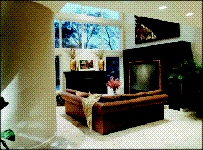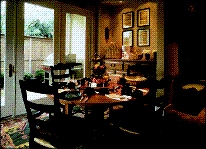The Peace And Quiet of Concrete
Land for homebuilding is becoming scarcer, forcing homes closer together and near noise sources like highways, railways, and airports. Concrete homes provide the necessary sound reducing qualities to provide the kind of quiet comfort we all look for in a home.
 The quiet comfort of concrete makes a concrete home a solid investment in lifestyle.
The quiet comfort of concrete makes a concrete home a solid investment in lifestyle.
The greater mass of concrete walls can reduce sound penetrating through a wall by more than 80 percent when compared to wood-frame construction. Although some sound will penetrate the windows, a concrete home is often two-thirds quieter than a wood-frame home.
Comfortable Living
Because concrete homes are built with solid concrete walls they are more airtight than wood-frame. The continuous layer of rigid insulation used in concrete construction provides a consistent thermal barrier unlike wood-frame and batt insulation which has gaps in the insulation. This reduces drafts and cold spots inside your home resulting in more comfortable living spaces throughout your home.
Thermal Mass = Even Temperature
The mass of the concrete also has the heat-absorbing property called thermal mass. This smooths out swings in temperature during the day. It keeps the house from overheating or getting suddenly cold when the furnace or air conditioner cycles on and off throughout the day. It also helps keep the house cool in the summer and warm in the winter resulting in year-round comfort.
Lower Energy Bills
The same qualities that bring you the quiet comfort of a concrete home--thermal mass and consistency of insulation--also brings the peace of mind of saving money. Concrete homes can often reduce energy bills by over 50 percent compared to wood-frame homes. It's not often an investment pays that kind of a return.
 Make an investment in life style with a quiet concrete home and save money on energy bills at the same time.
Make an investment in life style with a quiet concrete home and save money on energy bills at the same time.
That is The Beauty of Today's Concrete
There's more than one way to build your concrete home - insulating concrete forms, concrete masonry, aerated concrete, tilt-up concrete, or precast concrete to name a few. With volatile wood prices, logging's high environmental price tag, and a growing shortage of high quality lumber, concrete offers a variety of products and construction techniques to provide cost effective, quality alternatives to wood-frame home construction.
All of these systems share the same basic virtues of concrete - beauty, strength, durability, low maintenance, energy efficiency, interior environmental quality, environmental friendliness, and peace and quiet. Which concrete building technique is right for you depends on the labor force and predominant building practices in your area. Whatever your choice, you can rest assured that your beautiful concrete home is built to last.